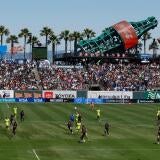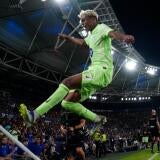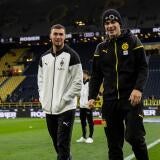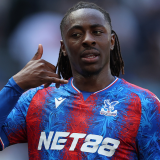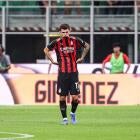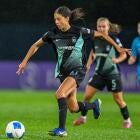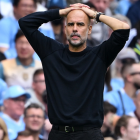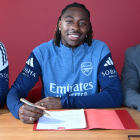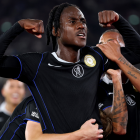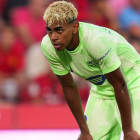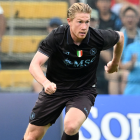How the NWSL initiated an extreme heat delay for the Kansas City Current vs. Orlando Pride game
A lot goes into deciding whether to push back the start time of a game due to extreme heat, and here's what you should know
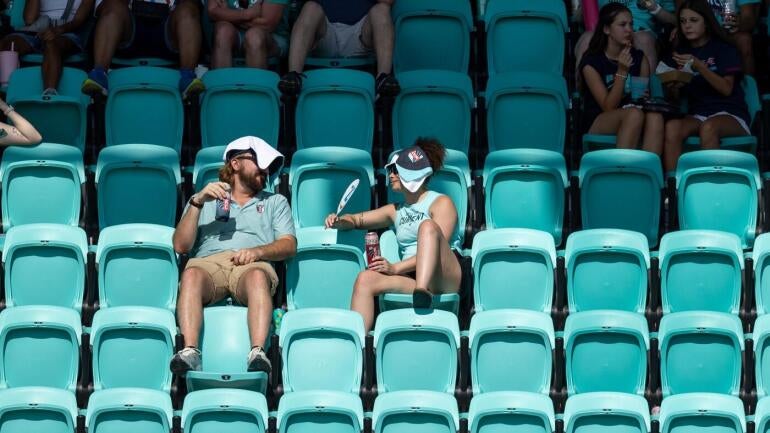
Sweltering afternoons are a staple of American summers, but in Kansas City on Saturday, the conditions were harsh enough to force a rare decision – the delay of the NWSL match between the Kansas City Current and the Orlando Pride due to extreme heat.
The anticipated matchup between two of the league's top sides was originally scheduled for a 3 p.m. local kickoff but did not begin until 6:28 p.m., nearly three and a half hours passing before players were allowed to take part in the match. The lengthy delay was a showcase for the implementation of a rule few leagues have actually had to put into use, as well as the unique complications of such a policy. While the NWSL's decisions on Saturday were rooted in player safety, the league said it could only make these calls on gameday, creating a stop-start quality to the afternoon as they came close to kicking off the game a handful of times before extending the delay.
"The league aims to play matches as scheduled whenever safely possible," the NWSL said in a statement. "While forecasts guide planning, we primarily rely on real-time, on-site weather data to make informed decisions in accordance with our inclement weather policies and protocols. Based on those inputs, the league made the decision to delay [Saturday's] match."
Here's a look at the NWSL's policies for extreme heat delays, as well as the precedent and impact in other soccer competitions.
What is the NWSL's extreme heat policy?
The NWSL's rules kicks in when the air temperature is above 90 degrees Fahrenheit and the National Weather Service has issued either an extreme heat warning, watch or heat advisory in the area that the match takes place in.
In that case, the fourth official was tasked with collecting wet bulb globe temperature (WBGT) readings at a different cadence than usual. On days where hydration breaks might come into play, the fourth official collects the WBGT reading twice – once right after pre-match warmups and another time directly after the whistle blows to end the first half. The WBGT reading would have to be 82 degrees Fahrenheit or higher to initiate water breaks.
When the league is collecting information related to an extreme heat delay, though, the fourth official does the first WBGT reading 60 minutes before the scheduled kickoff. If the reading is above 92.3 degrees Fahrenheit, the home team's operations staff is required to alert the league. A second WBGT reading is conducted 45 minutes before the scheduled kickoff, and if the reading is not below 92.3 degrees Fahrenheit, the extreme heat delay officially begins. The fourth official then conducts WBGT readings every 30 minutes, according to the NWSL's 2025 competition rules and regulations. If the WBGT reading falls to 91.3 degrees Fahrenheit, it is then up to the fourth official, both teams' medical personnel, as well as operations and technical staff, to decide if the match can start.
Postponements are possible in the event of an extreme heat delay but one was not required on Saturday in Kansas City. The extreme heat policy is included in the league's new collective bargaining agreement with the NWSL Players Association, which was ratified last year.
Have other soccer games been impacted by extreme heat?
MLS has had a very similar extreme heat policy for several years now, but like the NWSL, the league has rarely put those rules into action. Earlier this year, though, MLS did push the kickoff time of Austin FC's match against Atlanta United from 7:30 p.m. local time to 8 p.m. because of record-breaking heat. The decision from MLS came the day before the match was played, rather than on gameday like the NWSL's decision on Saturday.
Other soccer matches have taken place on incredibly hot days, though they were frequently played as scheduled. Several matches at this summer's FIFA Club World Cup kicked off when temperatures were over 90 degrees Fahrenheit, and none were delayed for heat, though some were because of lightning storms in the area.
How did the teams react to the delay?
Saturday's extreme heat delay brought out a variety of reactions from players and coaches, including TikTok dances from the patiently waiting Pride players and Current captain Lo'eau LaBonta addressing the crowd at CPKC Stadium and saying, "Nobody, especially the players, are happy right now." Pride head coach Seb Hines said a lack of communication led to further confusion for the teams involved.
"It's brutal: Three o'clock, sun's beaming. We have to have the best interest for everyone who's involved here at the stadium," Hines said after the 0-0 draw. "A lot of confusion and lack of communication as well, of what the next steps were. It was extremely hot. It was too hot to play. We would have liked that decision to have been made earlier on, before warm-up, so they can probably prep a little bit better."
Even three-plus hours after the scheduled kickoff time, Current head coach Vlatko Andonovski said the heat was still very much a factor in the match.
"The match was a little more methodical, a little more of a chess match," he said. "It was hot! I mean, players could not maintain a certain intensity for a longer period of time. I'm not surprised at all that the flow of the game was the way it was."


